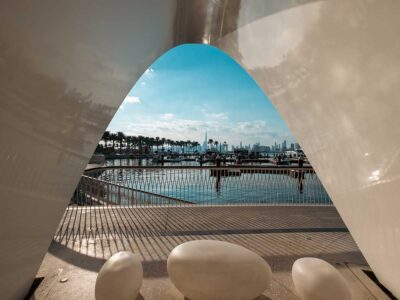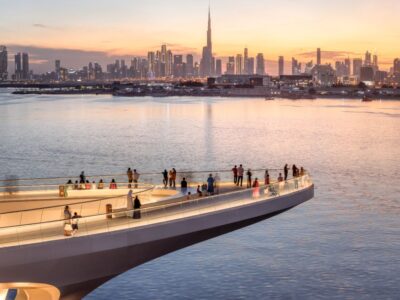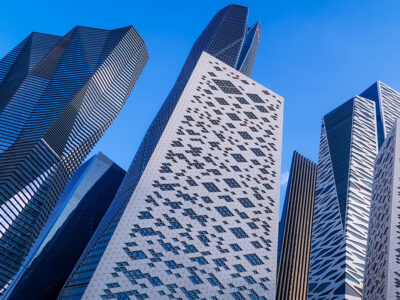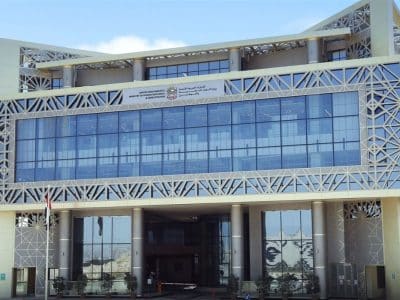Gulf real estate projects, either planned or under construction, saw a massive increase in value last year, according to analysis by CBRE.
Developments in the planning stage or beyond are now worth a staggering $1.68tn, says CBRE.
The Middle East’s real estate market is expected to continue its upward trajectory in 2024, with strong economic growth, demand and limited supply expected to drive performance, according to the CBRE 2024 Middle East Real Estate Market Outlook.
Middle East real estate
Economic growth in GCC countries showed fragmented performance in 2023, with the average rate of growth registering at only 0.6 per cent for the year, down from 6 per cent in 2022.
This softer headline growth rate has largely been driven by a number of GCC countries’ oil GDP rates of growth slowing or receding into contractionary territory, averaging a decline of 3.1 per cent.
This has been in contrast to their non-oil GDP growth rates, which have increased on average by 3.1 per cent.
In 2024, GDP growth in GCC countries is expected to strengthen, with headline growth forecast to reach 2.9 per cent.
While oil GDP is expected to recover with growth set to register at 2.2 per cent, the non-oil sector is expected to show a stronger rate of growth of 2.9 per cent, over the same period.
Although there are economic headwinds at both global and national levels, the latter mostly pertaining to the oil related activities, activity in the non-oil and particularly in real estate sectors remain buoyant across GCC countries.
As at 2024, the total value of real estate projects currently planned or under construction stand at an estimated $1.68tn, up from $1.38tn a year earlier.
Saudi Arabia accounts for 63.1 per cent of this total or some $1.06tn, followed by the UAE, which at $409bn accounts for 24.4 per cent of the total.
Bahrain, Kuwait, Oman and Qatar share 1.3 per cent, 3.2 per cent, 5.2 per cent and 2.9 per cent of the total, respectively.
The investment and development of the built environment, is a core part of the diversification strategies of GCC countries. The increased levels of investment showcase the seriousness of the desire to achieve such goals.

Taimur Khan, Head of Research – MENA at CBRE, said: “The region’s economic prospects remain positive, defying the global macroeconomic backdrop as regional economies are set for stronger growth and inbound investment levels, something which will continue to underpin a strong performance and demand in the region’s real estate sector.
“In the GCC’s residential market, price performance has almost uniformly been positive over the course of 2023.
“Whilst the direction of price changes has converged towards a largely positive territory, we continue to see a significant polarisation in the rates of growth witnessed, something we expect to see continue.
“In the region’s key office markets, robust level of performance seen in 2023 is expected to continue, that being said, global economic headwinds and lack of stock in key markets may hamper market activity.”

Office real estate sector
In 2024, CBRE expects the robust level of performance seen in 2023 to continue. However, global economic headwinds and lack of stock in key markets may hamper market activity.
In Bahrain, Prime and Grade A rents remained stable in 2023, as occupancy increased by 4 percentage points, with new supply remaining relatively constrained.
With supply expected to increase by 1.1 per cent in 2024, amid the continuing flight to quality trend, CBRE expects that rental rates will continue to edge down over the course of the year.
In Saudi Arabia, occupier activity will remain relatively concentrated within Riyadh, where, given the elevated demand levels from both national and international occupiers, headline occupancy rates reached 98.1 per cent in Q4 2023.
Occupier activity in the UAE is likely to remain resolute in the year ahead. Performance within Abu Dhabi’s occupier market will remain relatively strong.
CBRE forecasts that Prime and Grade A assets will continue to outperform the market, given the scarcity in supply and rising demand for high-quality assets.
In Dubai, with the lack of existing quality stock, elevated demand levels and the limited number of developments in the pipeline, which are seeing strong pre-leasing activity, rental rates are expected to continue their upward trajectory moving forward, however at a slower rate than the year prior.

Residential real estate
Over the course of 2023, price performance in the GCC’s residential sector has almost uniformly been positive.
Looking at Bahrain in 2023, apartment rates registered an increase. It is anticipated that with the continued addition of quality stock and attracting regional investment, there will be steady growth in rates for 2024.
Villa sales rates, based on plot area, which are predominantly driven by local market demand, are likely to remain relatively stable.
In Saudi Arabia, CBRE says price performance will continue to be fragmented over the course of the year, both across cities and typologies.
The property expert says average price growth in Riyadh will materially outperform other key cities and that transaction volumes will stabilise in 2024 after two consecutive years of declines.
The UAE continues to be the only market which has recorded both price and transaction volume growth in 2023.
In Abu Dhabi, transaction volumes are expected to grow over the course of 2024, with new high-end and prime stock expected to underpin stronger rates of price growth on average.
In Dubai, CBRE says transaction volumes will decrease, but only marginally. Price growth in the apartment and villas segments of the market will continue, although the rate will moderate somewhat over the course of the year, said CBRE.

Hotel sector real estate
In the majority of locations within the GCC, the hotel sector has seen visitation continue to grow in 2023, with key indicators largely sitting above pre-COVID levels.
While there are some exceptions, the most notable of which are Kuwait, and Muscat, market sentiment is broadly positive.
Overall, CBRE expects visitation to continue increasing within the GCC in 2024, however these increases will be felt disproportionally between countries.
Bahrain has seen mixed performance in 2023, with overall improving occupancy and RevPAR figures.
There continue to be additional luxury resorts and city hotels added to the stock.
In Saudi Arabia, the coming year will be a transitional one, as new destinations continue to be developed, and traditional homes of domestic leisure visitation such as Al Khobar, Jeddah and Abha find themselves in a more competitive market.
In the UAE, various governmental initiatives have created pockets of opportunity in locations previously overlooked.
In Abu Dhabi and Dubai, the beachfront luxury segment of the market is expected to continue registering outperformance, both in terms of occupancy and ADRs throughout the next twelve months given the declining stock of beachfront sites, and therefore the limited opportunities for supply expansions.

Retail real estate sector
In Bahrain, although the average occupancy rate has increased in 2023, there are a number of retail assets which continue to see occupancy rates remain stagnant or decline.
As a result, many landlords are having to accept an occupier favoured market.
With supply expected to increase in 2024 and beyond, CBRE says the occupier favoured market is set to continue, and even become more exacerbated in secondary assets.
In the UAE, in 2023, average rents increased in Abu Dhabi and Dubai by 10.7 per cent and 17.6 per cent, respectively.
Levels of demand in both Abu Dhabi and Dubai will remain strong, but the lack of quality stock, particularly in Dubai, remains the most significant concern.
Industrial and logistics real estate sector
The GCC’s industrial and logistics sector continued to see demand outpace supply across a number of key locations.
While there is considerable capital allocated to the sector to help ease the issue of limited supply, factors such as the lack of serviced land, evolving regulatory landscapes and rapid changes in planning and zoning regulations in nascent and developing markets, are causing investors and occupiers to stall potential activity or adopt a wait-and-see approach.
In 2024, CBRE expects additional supply to be delivered in a number of cities across Saudi Arabia and the UAE, but says this will not cause downward pressure on rents. CBRE analysts say that average rents will continue to increase, albeit with the rate of growth likely to moderate somewhat.







